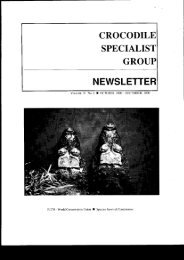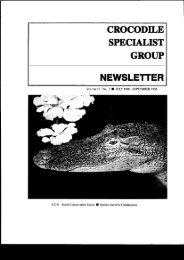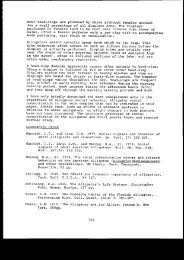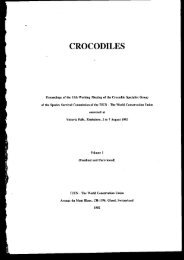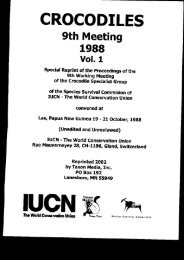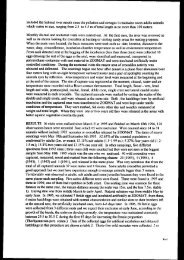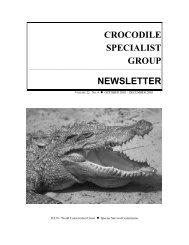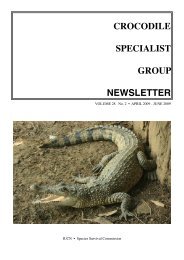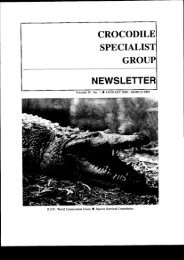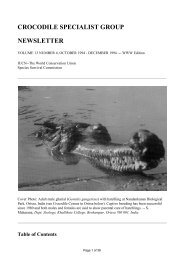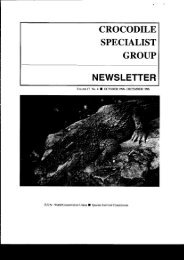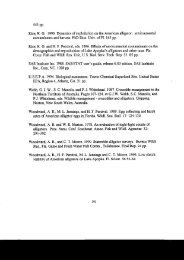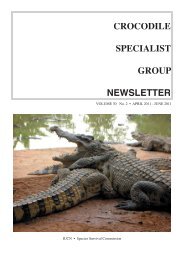size: 5405KB - Crocodile Specialist Group
size: 5405KB - Crocodile Specialist Group
size: 5405KB - Crocodile Specialist Group
You also want an ePaper? Increase the reach of your titles
YUMPU automatically turns print PDFs into web optimized ePapers that Google loves.
Running over a minimum of 3 years of time, the program includes:<br />
Ecological monitoring and creation of a Study Centre and Valuation of Wet Zone: CEVZHU. The<br />
CEZHU is a science center for monitoring and conservation of the wetland. It hosts the program<br />
activities at the heart of the project area, on the island of Karey-Kopto. There, working eight ecoguards<br />
trained by the project and features the ranger station in ecological monitoring and the fight<br />
against poaching. The establishment of permanent ponds for Nile crocodiles on the Island<br />
Conservation Karey Kopto. The setting up of a reintroduction of Nile crocodile to strengthen the last<br />
wild populations.<br />
The Development of Income-Generating Activities such as a Fish Breeding farm (9 breeding ponds<br />
and 18 floating cages) and help to value agricultural by-products through granulation (making food).<br />
More can be learned about this program at www.coeco.asso.fr.<br />
The idea of having a third meeting in Benin in the Penjari Park next autumn was abandoned, as the<br />
place was part of the WPACA complex and not bring anything new. The responsibility to organize<br />
the next West African Meeting was taken over by Mathew Shirley.<br />
Matthew Shirley report<br />
Since the 2012 CSG meeting in Manila there have been some very exciting updates in western<br />
Africa. First, I am very happy to say that I have finally finished my dissertation, graduated and will<br />
be gainfully employed full-time in Gabon for the foreseeable future. As part of this, I will be<br />
looking to continue several crocodile activities in Gabon. In 2012 I partnered with the Smithsonian<br />
Institute-Gabon program to use satellite telemetry to explore the coastal movements of Nile<br />
crocodiles including their use of the marine environment. We are going to expand this project in<br />
2013 to look at the impact of the oil industry on crocodiles, particularly Dwarf crocodile abundance<br />
and trade. Since 2012 I have been working with researchers from the French IRD and University of<br />
Rouen to study a unique population of cave-dwelling Osteolaemus which we will continue, bringing<br />
in collaborations with Marissa Tellez to explore the coevolution of Osteolaemus and its parasites.<br />
Finally, as of late 2012 the Gabonese National Parks Agency (ANPN) has finalized drafts of the 10-<br />
year management plans for all national parks. Annual crocodile monitoring is one of the top<br />
biodiversity objectives for 6 of the 13 national parks. As part of this, I am collaborating with ANPN<br />
to look at the trade in crocodiles at the most significant bushmeat port in Gabon (Lambarene) with a<br />
view to making this sustainable so as to minimize the impact on protected crocodile populations.<br />
Outside of Gabon the most significant activity is taking place in Cote d’Ivoire. The Zoo National<br />
d’Abidjan has recently employed an independent zoo consultant to help rehabilitate this facility - an<br />
activity which has found the backing of all levels of government including the presidency and most<br />
embassies. The focal project of the zoo rehabilitation will be reinitiating captive breeding of the<br />
West African endemic Mecistops cataphractus for the express purpose of reintroduction. I visited<br />
the facility in February 2013 to train the zoo staff in crocodile handling and care, examine the<br />
facilities for rehabilitation needs, inspect the crocodiles towards the purpose of forming breeding<br />
groups, and establish the necessary links with the government and other institutions. Since that<br />
time, we now have M. cataphractus eggs from 7 different clutches incubating (something that has<br />
not happened since before 2000) and are signing agreements with the Ministry of Water and Forests<br />
to conduct a nationwide program on human-crocodile conflict and conservation. The former is<br />
focused on Crocodylus suchus due to human fatalities at the presidential palace in Yamoussoukro in<br />
summer 2012 and recent sightings of this species in the Ebrie Lagoon in downtown Abidjan. The<br />
latter is to be focused on M. cataphractus with the captive breeding and reintroduction playing the<br />
focal role. The national parks service is a ready and willing collaborator with whom we will work to



